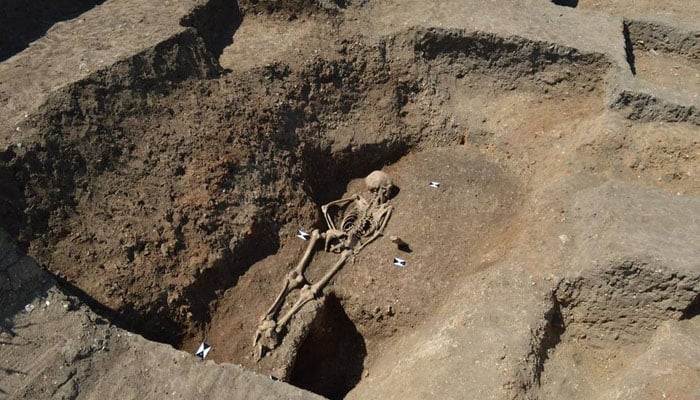A team of archaeologists found the dead body of a teenage girl buried with her face down and ankles tied near the village of Conington, Cambridgeshire in England.
The discovery made by the archaeologists signifies the possibility of the time of death of the 15-year-old girl dating back to 1000 years.
The grave of the unusual teenager is from the ninth century, the same time when the settlement’s residents began leaving the village. They removed their “elaborate entrance gate” and placed the girl’s body in one of the remaining trenches. The girl was buried face down and evidence implies that her ankles were shackled, confirmed archaeologists.
“The position of her ankles suggests they may have been tied together,” Don Walker, a senior human osteologist with the museum, said in the release. “This implies that the community took extra measures to ensure she could not ‘return’ from the grave.”
While there weren’t set burial traditions at the time, bodies were typically arranged face up, according to the museum.
The girl’s face-down burial “marks this young woman out as different,” experts said adding that she had a spinal joint illness aggravated by rigorous manual labour and evidence of childhood malnutrition in her bones, which suggested she may have belonged to a low social class.
Experts haven’t identified a cause of death, but they said it’s likely she died suddenly or unexpectedly.
The girl’s burial in the entry gate’s pit is also significant. A similar burial — a woman buried face down in a settlement’s boundary ditch — dating to the late eighth to ninth century was found about 30 miles away, as per the Miami Herald.
“We will probably never know exactly how this young woman was viewed by the community she grew up in, but the way she was buried tells us she was almost certainly seen as different,” Walker said in the release. “Her burial rites may have reflected the nature of her death, or her social identity, or that of her family.”
Conington, which means “King’s Town,” was likely abandoned when the Kingdom of Mercia’s influence waned in the early ninth century, according to researchers.
The young woman’s burial could have been “a symbolic final closure of the site” in Conington which is about 80 miles north of London.



Comments are closed.